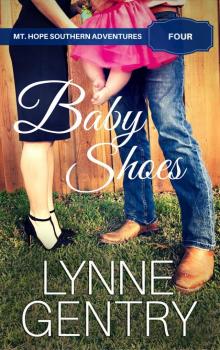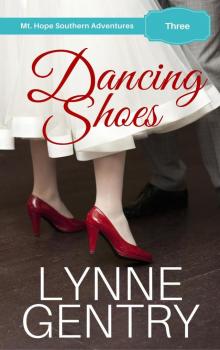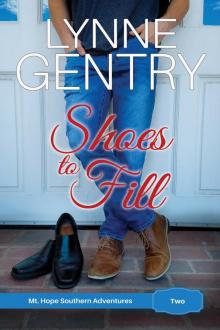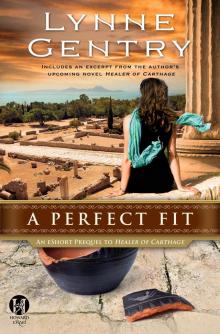- Home
- Lynne Gentry
Healer of Carthage Page 2
Healer of Carthage Read online
Page 2
She smoothed the wrinkled page, running a trembling hand across his scribbled words.
Have found your mother at the Cave of the Swimmers. Come quickly.
Lisbeth’s breath caught. Her mother had died when she was five. At least that’s how Papa had explained Mama’s sudden disappearance. His crew had searched the area desperately, but when they never recovered a body, Papa had been forced to conclude that Mama had lost her way in the dark. Lisbeth had accepted his explanation—loved him too much not to—but deep down she’d always wondered what really happened after the argument she’d heard outside their tent. She’d probably never know, and neither would Papa.
The bigger question now was why her father had returned to the Cave of the Swimmers. When he came to the States for her med school graduation, he’d said his next project was a sarcophagus excavation in Cairo. Why risk the political dangers of returning to an obscure cave tucked away in the farthest region of the desert hinterlands? More important, why risk upsetting her? Hadn’t they agreed they would never go back?
“Touch my Pringles and die, Hastings.” Queenie stood in the doorway, hands on hips, her licorice eyes trained on the chip cylinder. “Swiping snacks is so ghetto.”
Lisbeth tossed her the can, hoping her best friend wouldn’t pick up on the fact that she was near tears. “So call security.”
“I’m too tired.” Queenie plopped down in an empty chair. “Besides, who has time for all the red tape? We don’t even have time to pee.”
“Nelda’s against bathroom breaks.” Lisbeth’s pager buzzed.
“Aren’t you going to answer that?”
“I just need five minutes off my feet.” Lisbeth reached into her pocket and clicked the device to vibrate. “Nurse Ratched has been hammer-paging me all night. I’m sure she has ten new homeless guys who can’t live without me.”
“It’s your funeral.” Queenie rattled the chip can, then dumped the last few remaining crumbs into Lisbeth’s palm. “Make your last meal count.”
Pager vibrations coincided with an alarming voice on the intercom.
Code Blue. ER. Code Blue.
Lisbeth leapt from her seat, crammed the letter into her pocket, and bolted out the door.
2
Tunis, Tunisia
FAILURE TO PRACTICE SOUND medicine” echoed in Lisbeth’s head as she exited the customs queue in the Tunisian airport. Her residency coordinator had said she should consider her probation a lucky break, an opportunity for all concerned to apply the rehabilitative properties of time. He claimed two weeks off would help her regroup and refocus … the lie doctors have to tell themselves to beat back the shame of screwing up.
One lapse in judgment had killed a baby. In her mind, the mistake would never be history. If she’d failed once, she could fail again. The past was a wicked taskmaster that shaped the future with no regard to time.
Lisbeth pushed from her mind the peers that had avoided her, as if monumental mistakes were contagious. She hoisted the strap of her bag over her shoulder and strode into the oppressive humidity of the Mediterranean coast.
Across the street, sooty exhaust huffed from the tailpipe of a dilapidated bus pulling away from a hand-lettered cardboard sign. BUS STOP.
“Wait!” Arms waving, she raced across the street, dodging men on bicycles and speeding cars. “I can’t miss my connection!”
Breathless, she pounded the slow-moving vehicle’s door. The driver reluctantly flipped the lever, the door creaked open, and she hopped aboard. Heat-ripened bodies sucked every ounce of oxygen from the sticky air. Lisbeth dumped a few dinars in a tin can nailed to the dash. Behind the bus driver, she spotted a woman holding a basket of salted sea mullet. Next to her a small boy wrestled a scrawny chicken. No wonder the vehicle reeked of the same earthy scents that fouled the county hospital’s waiting room on Christmas Eve. The native woman made no effort to share her seat, so Lisbeth discreetly offered a coin.
The young mother snatched the money without a word and drew the boy with ebony eyes tight against her slight frame. Lisbeth perched on the wooden bench. Careful to stay clear of the chicken, she swung her bag into her lap.
The bus swerved through narrow streets lined with whitewashed houses trimmed in the cobalt blue of the sea. After they passed the amphitheater ruins, Lisbeth fished Papa’s letter from her bag.
Cave of the Swimmers. Had Papa lost his mind going back there? According to recent news reports, this part of the world had become a keg of dynamite with a short fuse. She was only a child when the Egyptian government shut down exploration of the mysterious chamber the first time, but she remembered enough to know she had to get her father out of there. Lucky for both of them, she just happened to be free … maybe permanently.
Lisbeth stuffed the envelope next to the stethoscope in the pocket of her cargo pants. It was stupid carrying such a cherished possession around. She wasn’t fit to use medical equipment anymore, and having it with her wouldn’t bring Mama back. But she couldn’t bring herself to leave the last piece of her mother behind. Lisbeth buttoned the pocket flap and gave the bus driver a quick tap. “This is my stop.” She slung the strap over her shoulder and stepped from the bus.
When the dust cleared, she stood alone on the end of a short, single-lane runway. In the opposite direction, a potbellied man kicked the tires of a prehistoric bush plane. A minute to gather her courage would have been nice, but her pilot was on time … a rarity for this part of the world. Lisbeth took a deep breath, plastered a smile on, then trudged toward the Cessna.
“I thought I hired a pilot, not an old buzzard,” she shouted over the whir of the propeller.
The sun-weathered man eyed her oversize bag as he wiped his ham-size paws on a bandanna. “You said nary a word about stayin’. ” Although Nigel’s hair had thinned considerably, he still had those keen blues eyes and a hint of Irish brogue that refused to succumb to the native languages he’d taught her around the campfire. “I ain’t lettin’ a wee lass linger at your da’s haunted cave.”
“Good to see you again, too.” Lisbeth’s extended hand went unshaken. “I’m not exactly a kid anymore.”
He shifted the tobacco bulge in his cheek. “I don’t care if you’ve become the bloody queen of England; the desert’s no place for you now.”
“You’ve carted me all over the Sahara.”
“And the last time I hauled your bony backside out, it was so you could make a life for yourself amongst the living. Become one of those fancy doctors like your ma. Marry some nice boy, and settle in one spot for more than a diggin’ season.”
“Plans change.” Her hand slid to the stethoscope in her pocket. “Besides, this isn’t your call, Nigel.”
“No.” He spit a brown stream, barely missing Lisbeth’s boot. “But it’s me plane.”
“Not really. My father’s grant money pays your bills.” Lisbeth pushed past him, his sturdy frame a comfort she’d missed. She opened the cockpit door, stowed her duffel behind the seat, and climbed in. “Don’t stand there gawking like an offended leprechaun. We’ve got a thousand miles to cover before dark.”
Nigel shook his head. “Too much political unrest in Egypt.” He swiped his brow with his sleeve. “I’m going to have to sneak this crate down Libya’s spine, then fly smack dab over blisterin’ sand to get to your old man.”
“When has working for the great Professor Hastings ever been easy?” Lisbeth belted in.
“Even with the added patrols, that godforsaken sandbox he’s diggin’ in again ain’t no place for a camel, let alone a pretty lass.”
Lisbeth retrieved the letter and showed Nigel the single sheet of notebook paper. “What does ‘found your mother’ mean?”
Nigel glanced at the shaky script. “That I best be haulin’ your arse to that cave, I reckon.”
“Don’t you think twenty-three years is a long time to hope for the impossible?”
Nigel patted her hand. “When hope’s all a person’s got, they can act a little daft.
”
“Daft?” She slipped the letter back into the envelope, fear thumping in her chest. Had years in the sun fried the brain of the man who’d taught her how to use a soft-bristle toothbrush to free a fragile artifact from its tomb, or how to layer tobacco leaves in the meerschaum bowl of a calabash pipe, or how to search the stars to find the one that would always lead her home? “You don’t really think Papa’s losing it, do you, Nigel?”
“You wouldn’t spend your life looking for your lost love?” Nigel folded into his seat. “Bet the man that put that rock on your left hand would be a bit disappointed if you said no.”
Craig had been conveniently tied up in surgery during her morbidity and mortality conference. His testimony might have smoothed things over, but he hadn’t wanted to risk tarnishing his reputation defending her mistake … or her.
“Are you going to help me get Papa out of there or not?”
Nigel’s sigh vibrated his mustache. He slammed the door and revved the engine. The plane bounced toward a cluster of fishermen’s dwellings blocking the end of the airstrip. At the last possible second, Nigel pulled hard on the stick. The plane’s nose lifted. They skimmed over several flat roofs.
Lisbeth used her sleeve to wipe grime from the window. “Can we buzz the Roman ruins?” She glanced at Nigel. “For old times’ sake?”
A crooked grin lifted his mustache. They banked toward the shimmering emerald waters.
“I forgot how beautiful it is here.” Lisbeth pressed her nose to the glass.
Passing centuries had taken a bite out of Carthage’s circular historical treasure. A few crumbling stone walls, a smattering of stubby pillars, and a steady stream of cruise ship tourists were all that remained of the ancient harbor that once ported Rome’s powerful navy. Like Papa, she despised the visitors who tramped through archaeological ruins with their new sneakers, cheap guidebooks, and total disregard for the forgotten. Maybe she should have become an archaeologist like Papa instead of trying to fulfill his wish that she be more like Mama. Mummies didn’t circle the drain and die without warning.
Lisbeth let her hand slip inside her pants pocket. She fingered the steel bell of the stethoscope engraved with the initial M. Mama was the real doctor. If Papa was slipping mentally, Mama should be here making the decisions. That’s what families do. They take care of each other, support each other, and make decisions together. They don’t disappear and never come back.
“Seen enough?” Nigel shouted over the roar of the engine.
She could never get enough of this exotic land she’d once called home, but she gave a reluctant nod. Nigel cranked the stick. The plane abruptly circled back toward the scrappy mountain range that sliced this huge continent into two very different worlds.
They cleared a series of barren peaks and a thin ribbon of grassland. Miles of sand stretched in every direction. Unlike the lesser deserts that dotted the globe, the Sahara had varying degrees of hell, each one more damnable than the last. Of course, her father would choose to make camp in the most condemned sector.
Blinding sunlight warmed the tiny cockpit. Lisbeth fought claustrophobia by allowing the rising heat and steady engine hum to quickly sedate her. She slept, deep and hard, for the first time since Abra’s death.
Several hours later, Nigel elbowed her awake. “Cave’s up ahead.”
Lisbeth shifted and dug at her eyes. In the distance, the immense flat-topped shelf of Gilf Kebir rose from the desert floor. The plane skimmed a series of highland cliffs, then dropped over the edge into the Aqaba Pass, a dry river valley lined with huge white dunes.
Twenty-three years ago her family had approached the cave from the ground, yet even from this totally new perspective, she immediately recognized the strange rock formation. The upside-down ice cream cone had haunted her dreams since she was five.
In the shade of the giant conical granite, Lisbeth spotted tents. Fear, nerves, and excitement tangled in her throat.
“Shall I buzz ’em?” Nigel teased.
She shrugged. “Aisa will poison your supper.”
“That dodgy fry cook’s been tryin’ to kill me for years. Might as well give him a reason.”
“It’s your funeral.” Lisbeth’s stomach tightened over the memory of Queenie saying those exact same words right before Abra’s Code Blue.
Nigel whizzed low over the makeshift settlement, tipping the wings at the series of white tarps stretched over PVC poles. A wiry little man, his head wrapped like a sheik, hopped around, shaking his fist at the sky.
Lisbeth released a nervous laugh. “It’ll be camel chips for you tonight, Nigel.” A flash of metal on the bluff quickly sobered her. “What’s with the armed guard?”
“The good professor’s sittin’ on a volcano about to blow. Government’s threatening to shut him down.”
“After they just let him in?”
“Bandits.”
“Oh.” Maybe she shouldn’t have ignored the international travel warnings. She slid Craig’s engagement ring over her knuckle and slipped it into her pocket for safekeeping. “The skeleton of a twenty-first-century woman can’t be worth that much on the antiquities market.”
“It’s the water they want.”
“Well, who doesn’t in the desert?” Lisbeth remembered Papa’s insistence that a labyrinth of underground caverns, full of fresh water from rains that occurred over ten thousand years ago, existed thousands of feet beneath the Sahara’s sand. “Papa couldn’t possibly have tapped those subterranean aquifers.”
He rubbed the back of his neck. “Hard tellin’ with the professor.”
“How many guards?”
Nigel looked over his shoulder, his eyes meeting hers. “Not enough,” he said. “Not nearly enough, lass.”
The plane touched down with a jolt. Sand pelted the fuselage. Nigel held a steady course toward the cave. Two wheels sliced through the crusty riverbed, leaving a deep incision that rivaled the work of an accomplished surgeon.
Lisbeth’s mouth went dry.
Time had changed the size of the cave. Or had time changed her? The entire geological structure seemed smaller than she remembered, not nearly the mammoth demon of her memory. Yet, something about returning to the place she’d hated for years felt like coming home.
They taxied to a stop less than thirty yards short of her reckoning with Papa.
She fiddled with the latch on her seat belt. Someone yanked open the passenger door. Heat engulfed the cabin.
“Lisbeth.” Her father’s cook smiled up at her, his mouth a dental student’s dream of rotting or missing teeth. He held out two stringy arms.
“Aisa!” Lisbeth bailed from the plane.
“I told the professor that when the moon was right, you’d come.” Aisa’s Arabic had an Egyptian spice, mild with a surprising afterburn. His scraggly beard, a bit grayer than she remembered, had not been trimmed since she left for med school. Duct tape held together dark-framed glasses that sported thick lenses etched by the desert winds. The vision correction magnified his black eyes to twice their normal size.
Lisbeth gave the camp a quick survey. Except for a muscled man toting a cooking drum to the shade of a tarp, the place appeared deserted. “Where is he?”
“Hardly eats. Digs in the cave all hours of the day and night.”
“I’ll fetch Papa, Aisa.”
While Aisa and Nigel continued their ongoing battle over the missing supplies, sand in the soup, and who had the bigger grievance against whom, she set out for the cave.
“Papa,” she called.
“Beetle Bug!” Papa’s radio-perfect bass boomed from the cave entrance. “You came.” His unbuttoned, faded chambray shirt flapped behind his lean body as his long legs ate up the distance with the agility of a man half his age. “My beautiful girl.” He scooped her into his arms and twirled around.
Lisbeth held on tight, burying her nose in the smell of pipe tobacco and dust. “I missed you, Papa.”
“Your mother will be so glad you’ve c
ome.”
“Mother?”
He set her on the ground, clasped her shoulders, and leaned back. They exchanged their first up-close looks at each other. He’d aged ten years in the six months since her med school graduation. Why had his physical health declined so rapidly? She didn’t know what she’d do if his mental capacity had followed suit.
“Doctor Hastings.” The prideful way her father said “doctor,” as if his dreams had materialized and she had miraculously become just like her mother.
It seemed he was not so mentally gone that he’d lost his expectations. The truth of her failure would gut him like a double-edged sword. How could she disappoint the man who’d taught her everything he knew and sacrificed so much to send her to learn more? She couldn’t tell him, not until she knew for sure how much he could handle.
Trying to forget that her father was carrying on as if a dead woman were busy in the camp kitchen, Lisbeth said, “Let me look at you, Papa.”
Hazel eyes clear, focused, free of cataracts, and completely without a trace of the insanity she’d anticipated. Papa appeared more than lucid. In fact, this brilliant son of an Arkansas chicken farmer seemed sharper than ever. But she knew not to get ahead of herself. Accurately diagnosing dementia or Alzheimer’s required more than an initial evaluation. She needed a complete medical history, a mental status evaluation, a clinical examination, and a battery of lab tests. Even if Papa managed to jump through all of those hoops, she wouldn’t have a definitive diagnosis. Time was the truest test.
Lisbeth pulled free of her father’s grasp. “When can I see Mama?” She couldn’t help quizzing him to see if he’d abandon this impossible notion.
Papa’s eyes shot toward the cave, then darted back to her. “There’s time. Let’s get you settled, Beetle Bug.”

 Baby Shoes
Baby Shoes Dancing Shoes
Dancing Shoes Return to Exile
Return to Exile Finally Free
Finally Free Healer of Carthage
Healer of Carthage Shoes to Fill
Shoes to Fill A Perfect Fit
A Perfect Fit Valley of Decision
Valley of Decision